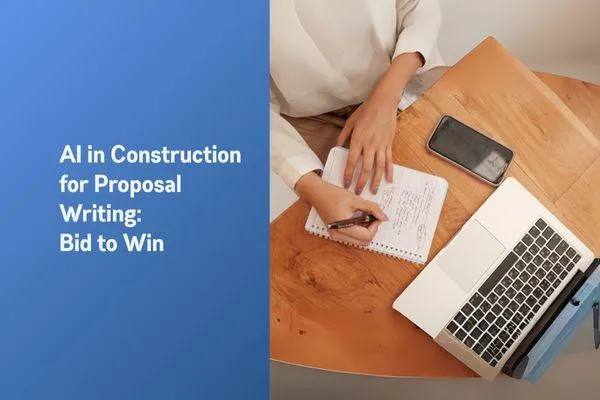
AI in Construction for Proposal Writing: Bid to Win
Here’s the truth no one talks about in construction: most bids are lost before the proposal is even written.
Not because the team moved too slowly or messed up the numbers, but because they wasted time on the wrong opportunities or told the wrong story.
It’s the silent drain in this industry: chasing bids you were never meant to win.
That’s where AI is quietly flipping the script. With AI in construction, you can find the right projects, write better proposals, and win more work. And you can do it without the late nights or the guesswork.
In this article, I’ll walk you through how AI can help you at every step, from finding the best RFPs to submitting proposals.
AI in Construction for Proposal Writing: Bid to Win
Find Construction RFPs Faster Using AI Agents
AI-Powered RFP Analysis: Understand Project Requirements in Minutes
Learn from Past Bids: How AI in Construction Improves Future Proposals
Accurate Cost Estimation and Material Takeoffs: Automated and Real-Time
Draft a Persuasive Proposal with AI for Construction Projects
7 Key Traits of an AI-Generated Winning Proposal
Risk Management with AI in Construction: Identify and Mitigate Risks Before You Bid
Bidding & Submission: Automating the Final Mile
Common Challenges in AI Adoption (And How to Overcome Them)
Case Examples of Successful AI Adoption

Find Construction RFPs Faster Using AI Agents
In the past, finding RFPs meant hours of manual searching across websites and portals. It drained time and energy without any guarantee of results. AI changes this.
AI agents scan multiple databases, tender platforms, and public records in minutes. They gather and organize relevant RFPs based on your business needs. You stop chasing dead ends and start focusing on the right opportunities.
AI-powered alerts notify you when new bids match your criteria. You can filter results by project size, location, and scope. This ensures every opportunity aligns with your capacity and goals.
Some AI tools even track competitor activity on previous bids. This helps you understand where you stand and how to stay competitive.
Advanced AI tools read between the lines of government tenders. They flag hidden risks or opportunities buried deep in documents. You see what others miss and position your business smartly.
AI-Powered RFP Analysis: Understand Project Requirements in Minutes
Reading bid documents takes time and focus. Missing details lead to costly mistakes. AI tools use Natural Language Processing to scan documents fast. They extract key project specifications in seconds.
AI highlights:
Compliance requirements
Critical deadlines
Possible risk factors
You see the information you need without wading through pages. Some AI tools use sentiment analysis on bid language. They help you understand what clients truly value.
This allows you to shape proposals that speak to client priorities. It sharpens your strategy from the start.
AI reduces the risk of missed details or non-compliance. It also flags bids that may not suit your business. This saves time, protects resources, and helps you focus on winnable work.
Learn from Past Bids: How AI in Construction Improves Future Proposals
Many construction firms repeat the same mistakes without realizing it. They submit bids without learning from what worked or has failed before.
AI helps you break this cycle. It analyzes your past bids, both wins, and losses. It highlights patterns that shaped the outcome.
AI tools compare your pricing strategies across projects. They help you adjust your numbers to stay competitive.
They also track seasonal shifts in material and labor costs. You can plan bids that reflect current market realities.
Some AI systems use neural networks. These tools analyze multiple factors together, like site conditions, labor shortages, supply chain issues, and regulations. This gives you more accurate estimates.
It also helps you avoid risks that could hurt your margins.
Small firms use shared industry datasets to access AI insights. You don’t need a big budget to get started.
AI helps you learn from every bid. The more you feed it, the sharper your future proposals become.
👉 Will AI Replace Construction Project Managers? Explores what’s hype and what’s actually happening.
Accurate Cost Estimation and Material Takeoffs: Automated and Real-Time
Accurate pricing wins projects. Wrong pricing, whether high or low, puts your business at risk. Overpricing drives clients away. Underpricing destroys profit margins.
Manual takeoffs take time and cause mistakes. AI automates this by reading digital plans and identifying materials in minutes. AI in construction helps cut errors and save time.
It keeps estimates consistent across different projects. AI tools pull real-time material prices from supplier databases. This keeps your bids accurate as markets shift.
Material costs rise and fall often. AI helps you update estimates without manual work. AI also predicts future price changes based on past trends. This protects your profit before you submit the bid.
Firms using IoT data feed live project details into AI models. This sharpens cost accuracy further. With better data, you can price right, bid smart, and protect your bottom line.
Draft a Persuasive Proposal with AI for Construction Projects
A winning construction proposal is more than numbers. It shows the client you understand their needs and can deliver the results. AI helps you shape that message faster and with less effort than manual work.
Generative AI suggests realistic project timelines based on your inputs. This helps set accurate expectations from the start. AI helps you include simple, clear risk assessments. This builds client confidence and shows you plan for challenges.
AI highlights your USP (unique selling points). These help your proposal stand out when clients compare multiple bids. AI checks for tone, compliance, and alignment with the client’s priorities. This ensures your bid matches the language and focus the client expects.
You can train AI using your past successful proposals. This keeps your voice and messaging consistent across every bid you submit.
7 Key Traits of an AI-Generated Winning Proposal

Winning proposals share seven key traits. AI helps you meet each one without wasting time:
Compliance: Address all client requirements clearly.
Responsiveness: Respond directly to the project’s scope of work.
Competitive Focus: Highlight what distinguishes you from your competitor, with value along with fair pricing.
Strategy: Present a clear, tailored project approach.
Quality of Writing: Keep the language professional and easy to follow. Proposal evaluators are human like you, so keep your readability level high. Use short sentences and active voice as much as possible.
Visualization: Use graphics to clarify key points. Add captions and maintain a 50 percent ratio between text and graphics.
Page and Document Design: Maintain a clean, polished layout throughout. You may use your brand design kit. If you don’t have one, then AI can generate one for you.
AI tools help you cover all seven areas. You save time, sharpen your message, and improve your chances of winning.
Risk Management with AI in Construction: Identify and Mitigate Risks Before You Bid
Every project carries risk. Missing risks can cost time, money, and reputation.
AI uses predictive analytics to spot risks before bidding. AI identifies supply chain disruptions that may delay materials. It flags possible labor shortages that could stall work and tracks weather impacts that can affect schedules.
AI also supports “bid or no-bid” decisions. It helps you avoid low-profit or high-risk opportunities. AI models different project scenarios to build contingency plans in advance.
Procore reports that 59% of construction leaders already use or plan to use AI solutions for risk and compliance management.
Tools with predictive analytics can reduce project cost overruns by up to 30 %.
Proactive risk management gives you a clear advantage. You submit smarter, safer bids and protect your profits.
Bidding & Submission: Automating the Final Mile
The final step, submitting the bid, often feels rushed. Mistakes here can undo all your hard work. But fortunately, we now have AI to streamline this crucial stage by auto-filling bid submission forms.
This reduces manual errors and speeds up the completion process. AI checks each proposal against submission guidelines and flags problems with formats, word counts, and required certifications.
Collaborative AI platforms give your team real-time access to every document. This prevents confusion and keeps version control tight.
AI tracks deadlines, pending approvals, and missing documents. It even sends timely alerts so nothing slips through the cracks.
By automating these steps, you protect your hard work, save time, and submit stronger bids with less stress.
Common Challenges in AI Adoption (And How to Overcome Them)
Adopting AI in construction bidding comes with challenges. Understanding them early helps you move forward with confidence.

Resistance to Change
One common challenge is resistance to change. Many teams feel unsure about trusting technology with critical tasks. Open communication and small pilot projects help build trust.
Cost Barriers for SMEs
Cost is another concern, especially for small firms. The key is starting small. Many AI tools offer scalable options that grow with your business.
Data Quality Concerns
Data quality also matters. Poor or incomplete data can lead to weak results. Focus on organizing and updating your project data before introducing AI.
Training Needs
Training your team is essential. AI works best when people understand how to use it. Short, focused training sessions can close the gap quickly.
Case Examples of Successful AI Adoption
Many firms now use AI with clear results. One report found nearly two‑thirds of B2B leaders in the UK and EU saw ROI within a year of AI adoption. These leaders report faster bid responses, higher win rates, and more credibility in their markets.
👉 Want to master the chaos of building projects? This guide to Construction Project Management covers everything you need to stay on time and under budget.
The Future of AI in Construction Proposal Writing
AI will reshape how construction firms find, prepare, and submit bids.
End-to-end AI bidding pipelines will speed up every stage. You will move from opportunity to submission faster and with fewer errors.
AI will work with IoT and BIM systems to gather live project data. This will help you build more accurate and timely proposals.
Automated compliance checks will reduce legal risks and improve bid acceptance rates. AI will ensure you meet complex regulations without manual checks.
AI will also support greener, more sustainable bidding. You will measure environmental impacts and present eco-friendly project plans with confidence.
Construction firms that adopt these tools early will stay competitive and win more work.
Final Word from Purely Startup
AI is changing how construction firms approach proposal writing, from finding the right opportunities to submitting bids that win. It saves time by automating takeoffs, cost estimates, and document preparation. AI improves accuracy by learning from past bids, market conditions, and project risks. AI helps teams craft stronger proposals, make informed decisions, and avoid costly mistakes.
With tools that support every stage, research, writing, design, compliance, and submission, businesses can bid faster, smarter, and more efficiently. Construction firms using these innovations gain a real edge in today’s competitive market. Don’t just bid. Win.
Book a free consultation with us today to start winning bids!


